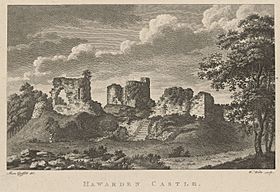Roger de Clifford (died c. 1285) facts for kids
Quick facts for kids
Roger de Clifford
|
|
|---|---|
| Justice in Eyre | |
| Born | c. 1221 |
| Died | c. 1285 |
| Spouse(s) |
|
| Issue | Roger de Clifford (died 1282) |
| Father | Roger de Clifford |
| Mother | Sybil de Ewyas |
Roger de Clifford (c. 1221 – c. 1285) was an important English soldier and judge. He lived during a time of big changes and conflicts in England.
Contents
Roger de Clifford's Life
Early Years
Roger de Clifford was born around 1221. His father was also named Roger de Clifford. When his father passed away around 1231, Roger was still a child.
In 1259, Roger traveled to France with King Henry III. They were there to work on a peace treaty with King Louis IX of France.
A few years later, in 1262, some people wondered if Roger was still loyal to the King. He had sent a letter to the King, along with other powerful lords, asking him to follow certain rules. Because of this, he was told not to take part in jousting or carry weapons without the King's permission. However, at the same time, he was put in charge of the royal castles of Ludgershall and Marlborough.
A Time of War
In 1263, Roger de Clifford joined a group of rebellious barons led by Simon de Montfort. They fought against King Henry III in what is known as the Second Barons' War. Roger helped attack areas in Wales and captured the cities of Hereford and Bristol. Because of this, he was officially removed from the church.
The next year, Roger switched his loyalty back to the King. He played a big part in the siege of Nottingham, where he captured Simon de Montfort the Younger. As a reward, he was given control of Gloucester Castle and became the sheriff of the county. He also became the main judge for the royal forests south of the Trent River.
Roger was captured during the Battle of Lewes, but he was later set free. He promised to appear in parliament when called. Instead, he used his freedom to gather an army for the King in Wales. With Roger de Mortimer, he helped take back Gloucester, Bridgnorth, and Marlborough. Because he didn't show up in parliament, he was declared an exile.
In 1265, Roger de Clifford and Roger de Leybourne helped save Prince Edward, who had escaped from Hereford Castle. Roger also showed great bravery at the Battle of Evesham in August of that year. He even saved the life of John Fitz-John, one of the few supporters of de Montfort who survived the battle.
To thank him for his loyalty, the King forgave a large debt Roger owed. He also gave Roger many lands in Warwickshire and Leicestershire. Roger also gained control of some lands in Westmoreland. Later, Roger arranged for his son, also named Roger, to marry Isabella, one of the daughters who inherited those lands.
Journey to the Holy Land
In 1270, Roger de Clifford joined Prince Edward's Crusade to the Holy Land. While he was away, his son Roger temporarily took over his role as Justice of the Forests. Roger de Clifford was an important person on the Crusade. He was one of the people who helped carry out Prince Edward's will in Acre in 1272. He also witnessed a special agreement in Gascony in 1273.
Around the same time, Roger de Clifford married a lady in France. She was known as the Countess of Lauretania. She passed away in 1301 and was buried in Worcester Cathedral. Roger's first wife was likely Hawyse or Avicia Boterell.
Later Adventures
When Roger returned to England in 1274, he was immediately sent to Wales with William de Beauchamp. Their job was to check on the border and make sure peace was kept. In 1275, he was back in France. He explained to King Philip III why King Edward could not help settle a dispute between two dukes.
In 1276, Roger was made governor of Erdesleigh in Herefordshire. In 1279, he became the Justice of Wales, meaning he was in charge of justice for the entire country.
During the last Welsh uprising, Roger was surprised by David, the brother of Llewelyn. This happened at Hawarden Castle on Palm Sunday in 1282. The soldiers in the castle were killed, and Roger was taken prisoner. He was badly hurt, and some even thought he was mortally wounded. He was then taken to Snowdon.
In the war that followed, Roger's son, also named Roger, tragically drowned. This happened on November 6, 1282, while he was crossing a bridge of boats over the Menai Straits. The Welsh launched a sudden attack, causing confusion among the English forces.
Roger de Clifford likely passed away around 1285. After his death, his family owed money to the King. However, his widow, the Countess, was allowed to keep her jewels. Before he died, Roger had given some of his property in the Jewry area to the city of London.


